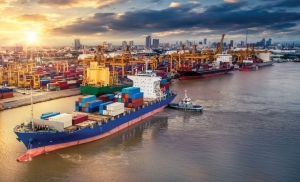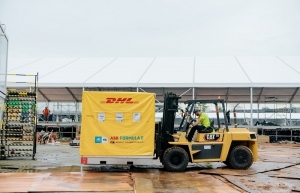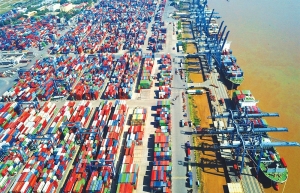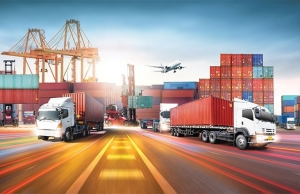Logistics landscape changing through e-commerce overhaul
This growth, driven by a young, tech-savvy population, increasing internet penetration, a growing middle class, and a shift in shopping habits, has created a surge in demand for effective last-mile delivery, warehousing, and order processing solutions.
 |
| Vlad Savin - Head of Business Development Acclime |
In 2022, the e-commerce market in Vietnam was valued at $14 billion, representing a compound annual growth rate of 26 per cent compared to the previous year. Retail e-commerce transactions accounted for about 8.5 per cent of the total sales of retail goods and consumer services. In terms of retail goods alone, online retail in 2022 accounted for 7.2 per cent of the total retail goods, an increase from 6.7 per cent in 2021.
Acclime’s signature industry report “E-Commerce Pivot in Vietnam 2022” anticipated that shoppertainment would become a significant trend in Vietnam’s e-commerce landscape. This was validated when TikTok surpassed Lazada to become the second-largest platform in Vietnam in the second quarter of 2023, after Shopee.
The logistics industry, often referred to as the backbone of e-commerce, has also seen significant growth.
In 2022, the warehouse and logistics sector grew by 12 per cent. The World Bank’s Logistics Performance Index in 2023 ranked Vietnam 43rd out of 139 countries, indicating improvements in trade and transport-related infrastructure, efficiency of customs processes, international shipments, tracking and tracing, logistics competence, and timeliness.
The rapid growth of e-commerce has put pressure on companies to deliver goods as quickly as possible. As a result, many are investing heavily in their in-house logistics systems to improve delivery speed and flexibility. This trend presents considerable opportunities for logistics providers and tech-enabled ordering and warehousing solutions.
The efficiency of last-mile delivery is a key factor in e-commerce, as it represents the final step in the journey of a product to the customer’s doorstep. In Vietnam, there has been a surge in demand for fast and reliable last-mile delivery services, leading to heightened competition among logistics companies to optimise their delivery networks, reduce delivery times, and provide real-time tracking options for customers.
A majority of e-commerce platforms in Vietnam have their own in-house logistics systems, accounting for around 70 per cent of order fulfilment. This allows for greater flexibility in managing the customer experience, ensuring the shortest order processing time and delivery time at the lowest cost, optimising resource use, and reducing fraud.
However, developing and maintaining in-house logistics requires a significant pool of supply chain experts, financial capacity, and technology. As a result, about 60 per cent of e-commerce participants opt for third-party logistics groups to ensure they can meet customer expectations in a timely manner.
E-commerce giants in Vietnam have developed their own logistics ecosystems - Shopee Express, Tiki Now, and Lazada Express - to optimise storage, pick-up, delivery, and return times during peak seasons. In-house systems help businesses control quality, speed, and performance. Cost is another benefit of managing internal logistics systems, as e-commerce providers can leverage internal staff flexibility to deliver products efficiently to metro areas at a lower cost per unit than third-party logistics.
With the rise in online orders, there is an increasing need for strategically located warehousing and fulfilment centres across the country. Ho Chi Minh City and Hanoi are the main e-commerce hubs in Vietnam, offering strategic locations and supportive infrastructure. An increasing number of logistic providers have invested in large-scale warehouses and logistics centres in these areas.
Logistics companies are investing in expanding and modernising their warehousing infrastructure to meet this demand. Investments are being made in logistics software such as in warehouse management and transportation management systems, as well as automation solutions to keep up with the increase in orders. Some companies are incorporating this visibility into a control tower to manage costs, improve customer service, and drive continuous improvement.
Several e-commerce and logistics businesses have started initiatives to elevate sustainable business practices in e-commerce. For example, Lazada Logistics plans to deploy 100 delivery e-motorbikes with the aim of reducing carbon outputs. This would make the company the first e-commerce platform in Vietnam to incorporate green delivery within its logistics processes. Delivery company Ahamove plans to roll out a fleet of 10,000 e-bikes by 2025 across Vietnam.
 | Shipping firms eye rosier future Vietnam's import-export sector is showing signs of improvement amid rising demand from major markets such as the United States and Europe. Since early July, world markets have witnessed a recovery in sea freight prices, a signal to many that the shipping industry has overcome the challenging times of the previous eighteen months. |
 | Logistics groups go green to add to net-zero goals Logistics enterprises are gradually participating in supporting the green production and circulation of goods in the country, as well as exporting and importing with more sustainable criteria. |
 | Logistics investors heat up the market The race to expand logistics market share continues to heat up, as both domestic and foreign enterprises increase investments in this field. |
 | The growth drivers for logistics arena Vietnam is attempting to boost its logistics efficiency in order to compete with others in the region. Head of Business Intelligence at Dezan Shira & Associates, Pritesh Samuel, analyses the drivers and hurdles in logistics development. |
What the stars mean:
★ Poor ★ ★ Promising ★★★ Good ★★★★ Very good ★★★★★ Exceptional
Related Contents
Latest News
More News
- Vietnam, New Zealand seek level-up in ties (February 19, 2026 | 18:06)
- Untapped potential in relations with Indonesia (February 19, 2026 | 17:56)
- German strengths match Vietnamese aspirations (February 19, 2026 | 17:40)
- Kim Long Motor and AOJ Suzhou enter strategic partnership (February 16, 2026 | 13:27)
- Haiphong welcomes long-term Euro investment (February 16, 2026 | 11:31)
- VIFC in Ho Chi Minh City officially launches (February 12, 2026 | 09:00)
- Norfund invests $4 million in Vietnam plastics recycling (February 11, 2026 | 11:51)
- Marico buys 75 per cent of Vietnam skincare startup Skinetiq (February 10, 2026 | 14:44)
- SCIC general director meets with Oman Investment Authority (February 10, 2026 | 14:14)
- G42 and Vietnamese consortium to build national AI infrastructure (February 09, 2026 | 17:32)

 Tag:
Tag:




















 Mobile Version
Mobile Version